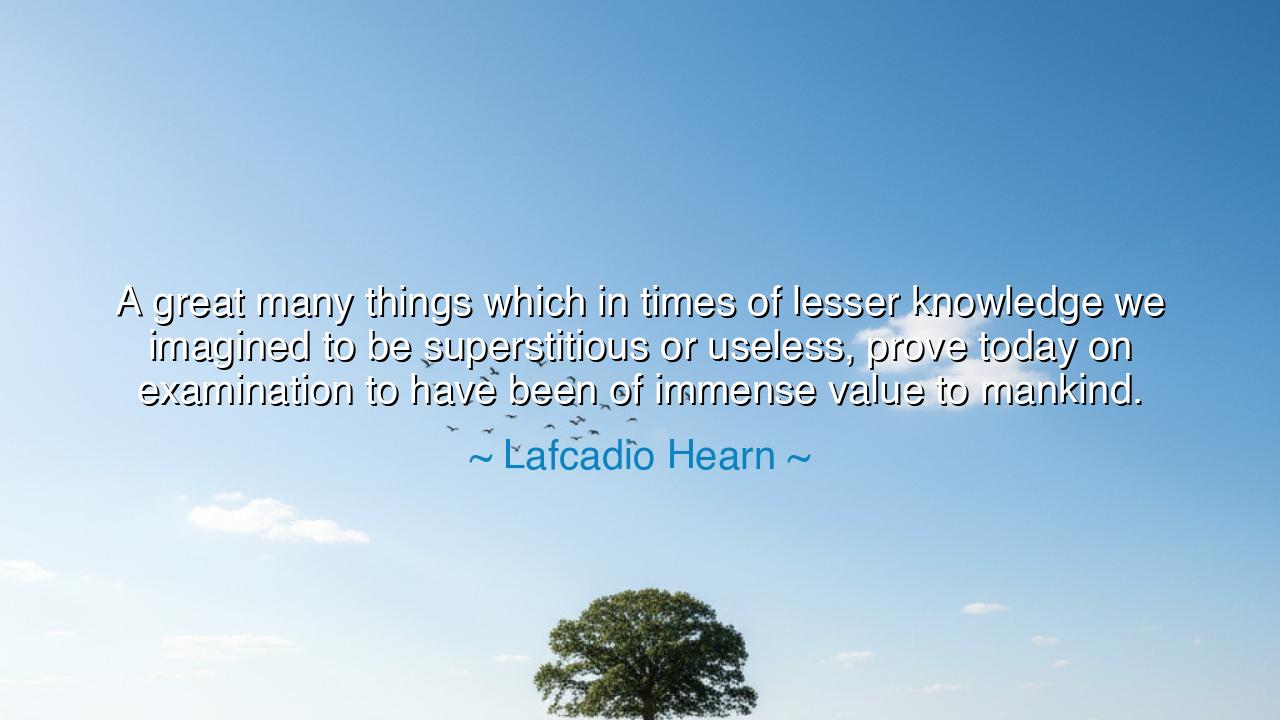
A great many things which in times of lesser knowledge we
A great many things which in times of lesser knowledge we imagined to be superstitious or useless, prove today on examination to have been of immense value to mankind.






"A great many things which in times of lesser knowledge we imagined to be superstitious or useless, prove today on examination to have been of immense value to mankind." Thus spoke Lafcadio Hearn, the wanderer between worlds—the man of the West who became a voice of the East. His words carry the calm wisdom of one who has looked beyond the surface of civilizations, seeing how the ancient, though often mocked by the modern, holds hidden treasures of truth. In this reflection, he calls us to humility, reminding us that knowledge is not a straight road from darkness to light, but a great circle in which old wisdom returns in new form. What we dismiss in our arrogance as superstition may, in time, reveal itself as the quiet labor of generations who knew more of life’s rhythm than we dared to admit.
In the age of science and progress, mankind often casts off the past like a snake shedding its skin, believing that each new discovery makes the old irrelevant. Yet Hearn, who lived among the temples and traditions of Japan, saw that beneath the veil of ritual and myth there lies a deep and enduring wisdom. The chants, the customs, the reverence for nature—these were not empty gestures, but intuitive sciences, truths felt long before they could be measured. He saw that humanity’s so-called “superstitions” were the early language of understanding, born from our yearning to make sense of the divine order. What seemed primitive was, in truth, the instinct of harmony with forces we barely comprehend even now.
Think of the ancient practice of meditation, once dismissed in the West as mysticism or folly. For centuries, it was seen as the idle dream of monks and hermits, useful only for those who had turned away from the world. Yet today, science itself bows before it, discovering that meditation calms the mind, strengthens the body, and heals the soul. The rhythm of breath, the stillness of thought—these are no longer superstition, but medicine. Thus, Hearn’s prophecy is fulfilled: what was once scorned has become salvation. Humanity, in its wisdom, rediscovers what it once abandoned.
The same could be said of herbal medicine, of ancient architecture built to honor the winds and the sun, of rituals that honored the dead and sanctified the earth. These were not primitive acts, but expressions of reverence and understanding. The ancients, lacking our instruments, still listened to the quiet voice of the world. They watched the stars, studied the tides, and felt the pulse of the seasons in their blood. Their knowledge was not written in books but carried in songs, in symbols, in prayers. And though we laughed at them, thinking ourselves wiser, we now find their echoes in our own discoveries—their intuitions confirmed by the tools of modern reason.
Lafcadio Hearn’s life itself was a living testament to this truth. Born in Greece, raised in Ireland, and reborn in Japan, he bridged the seen and the unseen, the rational and the spiritual. In the East, he found a culture that did not divide the two. The Japanese believed that spirits dwelled in trees, rivers, and stones—beliefs that Westerners once mocked as quaint. But Hearn saw in this animism a sacred respect for nature, a humility before life that modern man sorely lacked. He wrote of these “superstitions” not with condescension, but with wonder, for he recognized them as the moral fabric that bound the people to their world.
And indeed, in our age, when the earth trembles under the weight of human ambition, do we not see the truth of Hearn’s words? Those old customs that taught restraint, reverence, and balance—once dismissed as superstition—may be the very keys to our survival. The wisdom of the past, though wrapped in myth, often guards truths that reason has only begun to rediscover. We suffer not from ignorance of the new, but from forgetfulness of the old.
Thus, my children of knowledge, remember this: do not mock the past. Approach it with curiosity, with reverence, with the humility of one who knows that truth wears many masks. When you hear an old story, or see a forgotten ritual, ask not, “What use is this?” but, “What truth does this conceal?” For even the strangest custom may hide a lesson in patience, compassion, or unity. The ancients, though they spoke in symbols, knew the same world we know—they breathed the same air, gazed at the same stars, and sought the same meaning.
And so, take Hearn’s wisdom as a compass for your time: learn from the past, but do not worship it; question the present, but do not scorn it. The circle of wisdom is endless. What the old once dreamed, the new will one day prove. Let us, then, walk in gratitude for all that came before us—for even the smallest superstition may hold within it the seed of truth, waiting only for the light of understanding to bloom.






AAdministratorAdministrator
Welcome, honored guests. Please leave a comment, we will respond soon